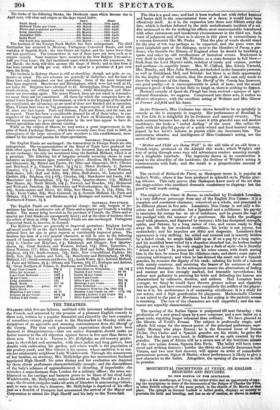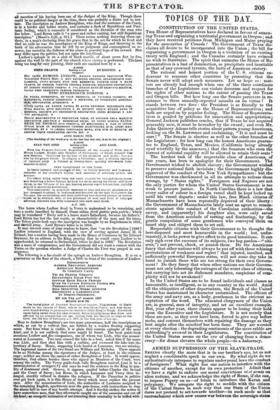MONUMENTAL INSCRIPTIONS AT VEVEY, ON ENGLISH REGICIDES AND REFUGEES.
TO TUB EDITOR OF THE SPECTATOR.
Sin—A few months ago, at Vevey, the writer of this had an opportunity of copy- ing the inscriptions on some of the monuments of the Judges of Charles the First, or other British refugees of the same period, in the church of St. Martin at that place. The epitaph on General Ludlow is rather prolix, displays an anxiety to proclaim his birth and breeding, and has an air of caution, as shown in sinking
all mention of his having been one of the Judges of the King. Though there could be no political danger at the time, there was probably a desire not to irri-
tate. The inscription on Andrew Broughton, who read the sentence of the Court, it in a briefer and bolder strain, and contains a flash of Republican and Puri- tanic. feeling, which is romantic if considered as the dictation of the man who lies below. Lord Byron calls it "a queer and rather canting, but still Republican inscription." (Moore's Life, p: 311.) There seems nothing deserving these epi- thets, in a man's declaring from his grave that in the act for which he lived and died an exile he was the mouthpiece of the King of Kings, and throwing in the teeth of his adversaries that be fell by no judgment and contemplated no re- morse, but rested in the fullness of his years in peaceful hope of his reward. Men may differ upon the politics, but not upon the hardihood. Ludlow's epitaph is on a slab of black marble, of about seven feet by five, against the wall in the part of the church where service is performed. The lines being too long for easy printing, their ends are marked here by a *.
A shield
MO GRAMM bearing sl.oti ET RESPICE. *
rampant.
Me TACIT Z1/1110INJJ LVLILOW, ANGLE'S NATIONS PROVINCIAS WIL- TONIENSDI FILMS HEN- * RICI EQVESTRIS ORDINIS, SENATORISQVB PAH- L/MEET; CVIVS QVOQVE FVIT WOE MEMBRVE, PATEVM STEM * MATE CLARVS, ET NOM'S, VIRTVTE PROPRIA NOBILIOR, RELIGIOSE PROTESTANS, ET INSIGNI PLETATE CORES'S- * eye .ETATIS ARNO 23 TRUIVEVS PAVLO POST EXESCITYS PR/RTOR pRimAEIVII.
TVNC HYBERNORVM DOM1TOR. *
IN PIIGNA INTREPIDVS, ET VIT/E PRODIGY'S, IN VICTORIA CLEMENS, IT liessvrrys, parave LIBERTATIS * DEPENSOR, ET POTESTATIS ARBITRA- BLE, OPPVGNATOR ACERRIMVS. * CVIVB CAVSA AS ELDER ',ATRIA 32 ANNIS EXTORRIS MELIORIQVE FOR- TVNA DIGNVS, APVD HELVETIOS * SE RECEPIT IBIQVE /STATES ARNO 73 HORIENS, OMNIBVB SVI DESIDERIVM RELINQVENS SEDES SETERNAS * Tilt ADVOLAVIT. *
HOCCE MONTSIENTVIS IN PERPETVAM TERRI, ET SINCERE ERGA MABITVM DEFVECTVM AMICITIM * MEMORIAM DICAT, ET VOVET DOMINA ELIZA- BETH DE THOMAS EIVS STRENVA, ET MGISTISSIMA * TAM IN INFOS- TVNIJs QVAM Ui EATRIMONIO CONSORS DILECTISSIDIA OWN., ANDRI MAO- N/TVDINE, ET * VI /.MORIS CONIVGALIS MOTA, EVE EVE IN EXILIVM AD OBITVM VSQVZ CONSTANTER SECVTA EST. Is ANNO DOMINI 1693.
[The doubling of the word Eva in the last line but one, is so in the original.)
.4shield STAY THY STEP bearing a lian AND L0011.
rampant.
'Beta lies Emmen, Lonzow, Englishman, of the county of Wilts. son of Henry Ludlow, Knight and Member of Parliament, of which himself was also Member. Illustrious by the line of hie ancestors, and noble ; but no. bier by his proper virtue. In religion a Protestant, and a shining example of en:anent piety A Colonel at twenty.three, speedily afterwards Corn- - mander-in-chief, TEEN vanorrisnsa or mut loran.
In battle intrepid and prodigal of life: in victory merciful and humane ;
defender of his country's liberty, and assailant of arbitrary power, the .keenest.
For which being exiled from the same country for two-and-thirty years,
• -and deserving a better fortune. he took his abode among the Swiss ; and there dying, in the 130 year of his age, leaving general regret behind him, joyfully
soared to maneions everlasting,. -
This monument, in perpetual Memory of true and sincere attachment to her deceased husband, is dedicated and devoted by the lady Exasessra DA Trmatas, his onshrinking and most sorrowing beat-beloved partner in iniefor- .,-- 'tennis-au in wedlock, who of her greatness of soul and force of conjugal
_ affection, followed him with constancy into exile until death, A.D. 1593.
- The house where Ludlow lived in Vevey is understood to be remaining, and bore a motto inscribed by himself, Oinne solum ford p. atria quia patris ; which may be translated "Every son is a brave man's fatherland, because his father's." lord Byron has lost the last words, so characteristic of the man and his times. The Vevey guide-book says the inscription was bought by an Englishman in 1821, and Carried away. Lord Byron's letter is in 1816. It may interest some of your readers to know, that "on the Revolution [1688] Ludlow returned to England, with the view of serving against James II. in :Ireland; but a motion having been made in the House of Commons by Sir Edward Seymour, for an address to the King, praying that he would cause Ludlow to be :apprehended, he returned to Switzerland, where he died in 1693." The Revolution was a mass of compromises, and the Government did not want a contest with tha .Tories.on the question whether a Judge of Charles the First was purged in eon- .sequence.
, The following is a fac-simile of the epitaph on Andrew Broughton. It is on a gravestone on the floor of the church, a little in front of the monument of Ludlow.
DEPOSITORIVM ANDREAS BROVGHTON ARMIGERI ANGLICAN' MAYDSTONENSIS
Dc COMITATV CANTy
VBI BIS PILETOR VRBANVS DIGNATVECIVE ETIAM EVIT SEN TENTIAM REGIS REGVM PROPARI
QVAM OS CAVSAM EXPVLSVS PATRIA STA
PEREGRINATIONS EIVS PINITA SOLO BENECTVTIS MORBO AFFECTVS
REQVIESCENS A LAI:Manna :WM
Is Domino Onnonanarr.
239 DIE FEB AN. Dwain 1687
.1ITATI5 SU.E 84.
The burial-place of Senna w BROUGHTON esquire, Englishman, of Maid- stone in the county of Kent, where he was twice Mayor, and was more- over found worthy to pronounce the sentence of the King of King.. For which cause being exiled from his own country, when his pilgrimage was done, and erected by no ailment but old age, resting from hie labours he slept in the
Lerd, the 230 day of February A.D. 1637;in the 04th year of his age.
Near to Andrew Broughtin's are two more gravestones half the inscriptions on which, as cut by a vertical line, are hidden by a woken flooring supporting seats: But from what is visible it is plain they contain epitaphs of the same kind; and it is not unlikely that more might be found. The local guide-book mentions Ludlow and jive companions one of .whom was Lisle, who was assassi- nated at Lausanne. Two men crossed the lake in a boat, asked him if his name was Lisle, and then shot him with a carbine, and recrossed the lake into the territory of Savoy. Hence, supposing Lisle buried at Lausanne, two are missing. The baptismal names of the two found are William and Nicholas. There appears to be no Nicholas among the signatures of the Judges, at least in the common copy; neither are there the names of either Broughton or Lisle. It would appear, therefore, that others besides those who signed as Members of the Court, were among the exiles. The Vevey guide-book calls Broughton amirat, (earn; it be a mistranslation of artnigeri ?) and says he read the sentence to the Jr in qua- lity of J.:cute/mot civil. Geneva, it appears, quailed before Charles the Second and the Court of Savq; but Berne to which Lausanne and Vevey then be- longed, sturdily refused to dismiss Borne, refugees. If the Puseyites in politics ever get back again, it is this House of Savoy which must replace the. present race. After the sq.ms.sination of Lisle, the authorities of Lausanne assigned to -the remaining English, apartments near the gate-house, with instructions to ring -the alarm-hell in case of any hostile attempt. And it forcibly strikes the writer to 114Yti Somewhere seen, that they afterwards caught one of the assassins and cut off ../da lisad; an energetic intimation of not intending their neutrality to be trifled with.



























 Previous page
Previous page